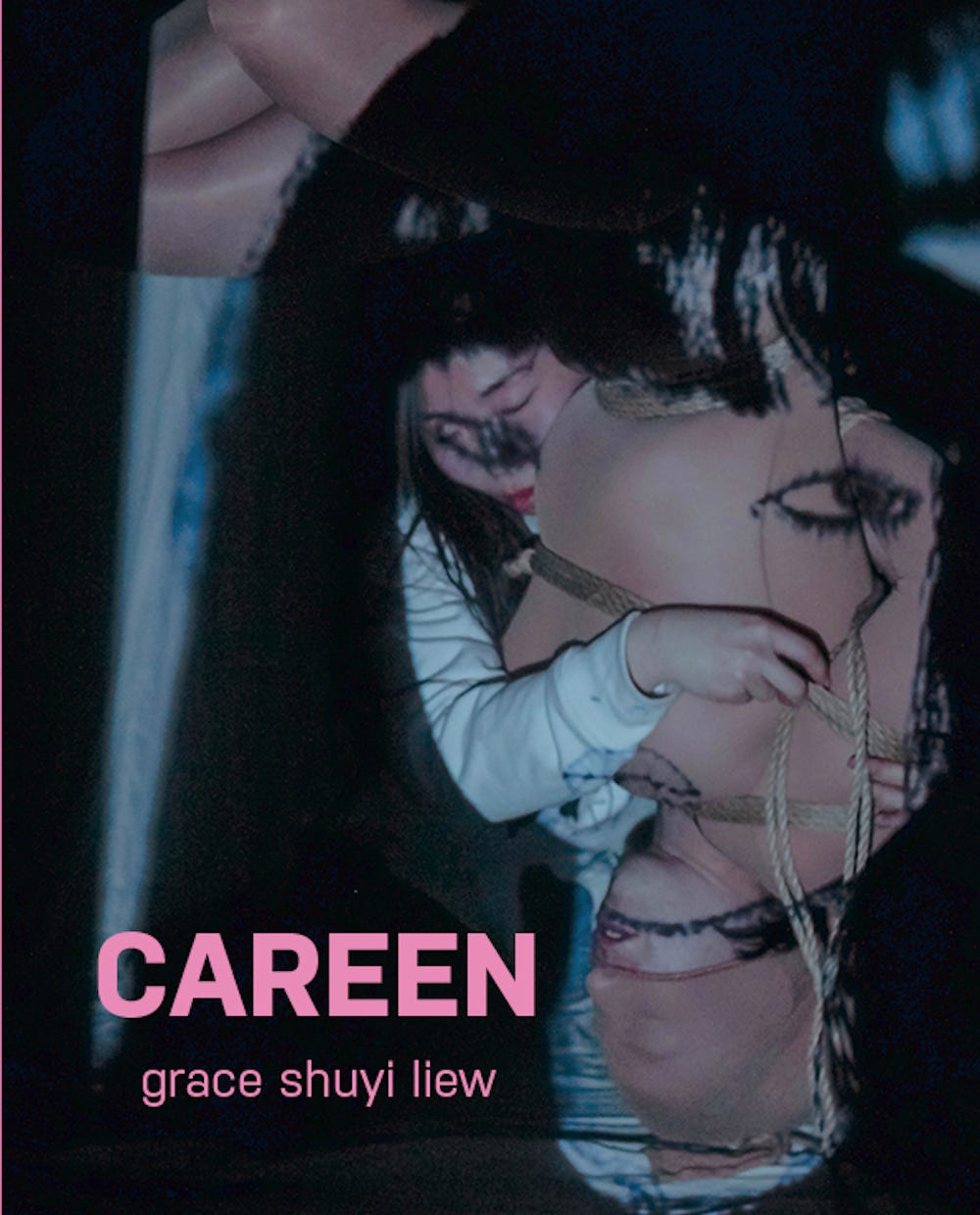“Emerging is one of your favorite things to do. You could walk up and out of an underground station forever.”

Grace Shuyi Liew sketches a world where “wrong” blooms, froths out of place. Careen, her first full-length book, is a dream abduction, off the rails. Hyper-enjambment keeps everything spinning, dashes resist closure — everything shifts surreally. Displacement is a jarring form of being, and Liew continually re-orients herself towards a world made strange.
From the get-go, we’re moving and we don’t stop:
I have since moved from a house by the train tracks to
another house
by another train tracks and every
night the train horn wakes me at
6am;
5am;
3 am;
tricks me
into believing the earth
is shattering from its
core
Liew’s accretive narration and off-kilter lineation kept me on my toes as a reader. There is no center, just another frenetic shift. One second we’re talking about dishwasher foam, then video games, trains, porn, and so on goes the digressive parade, spiraling forward with propulsive energy and “always hovering / at the outskirts / of a grand / unifying theory.”
De-centering: an affinity for edges and margins, an unfixed flickering among crevices and craggy openings. Unstructure is its own inverted landscape. “What’s left behind since then trembles faintly at the edges—an idea without an outline.” So too with genre. Hovering at the borderlands of memoir and verse, Liew offers flickering prose poems a la Rosmarie Waldrop. Parentheses (ready to disappear) (ghosting the sentence) pass, string one after another, forcing continued revision of the clause under question, or the prior parentheses, as a site for further excavation and revision. Consequentially, thingness, let alone subjectivity, is uncertain, ambiguous, and underfoot. We’re just passing through.
The body’s melancholia falls in love by flaunting its talent for mimicking grace
(or sheerness) (arduous passes) (lit/vanished lit/vanished) No one taught you
(yet you know) how to preserve a love (your palms leaking slices of light) how
your role is always to await spoilage (hushed under airtight thighs / yanked
from a hiding place / pacified to the tune of a white pulse) Let me see, let’s
see: how mimicry nurses melancholy / how every skip of your dropped heart
attunes to stillness (shhh).
Part of this feeling of displacement is, a la Glenn Ligon, an effect of being thrown against a sharp white background. A lineup of white lovers “all of whom / insist on hating Trump / while they fuck me—their rage / about The Administration dignifies / into a hard-on slinging / for my civic rights.” Liew’s full of these kind of zippy punchline ripostes, but the anger doesn’t lag far behind: “I can’t be loud / when Asian porn is still / a consumer category.”
The adventures really take off when Liew takes on a rogue premise: what “if we refuse white space as instituted home”? Where might the wayward stray instead to find home? “We must hew our own path,” Cathy Park Hong declared in her essay “Delusions of Whiteness in the Avant Garde.”
Liew’s self-formative odyssey takes on a careening cartography. Roving lyric essays and interludes take on coasts and cities—Berlin, New York, France, Los Angeles, always “toward your next destination.” But Liew can’t help but continue pursuing and collecting the wrongs. Sample the litany of complaints in Berlin: gray skies, bad sleep, a swollen lip, teary eyes, a stolen book, FOMO for the bridge party where she “didn’t kiss a perfect-skinned German girl and fall into her translucence.”
Eventually, a trip back to Kuala Lumpur. “The home state nurses a thirst for revenge that rages through your twenties,” Liew lukewarms in the second-person. “You return each year to steep like a teabag in muddy waters, eventually oversaturating the original means of holding.” Here, Liew’s graceful suturing of materiality and abstraction harken Mei-mei Berssenbrugge. But what they do not call to mind: nostos. Backwards glances and nostalgia-tinged dreams fail to align with the sensory data—instead, infinite distance. “You will want yourself all over again, once you diminish the size of your own warnings.”
Turns out maps are rarely as tidy as they first appear. No one mentions the plunging motion of centrifugal motion, the scarred underbelly. Disappointment waits at the taxi queue. Careen is, to the end, a “tale of statelessness.” Which is to say, it caves to the reliefs of failure, to the pleasures of washing off, to the succor of discarded locations, to the solace of blue weekends. Liew imbues all of these sites with the potentiality of emerging. And look: “EVENTUALLY EVERY COLOR CAREENS INTO ITS OWN LACK.”
Careening Cartography was originally published in Anomaly on Medium, where people are continuing the conversation by highlighting and responding to this story.
